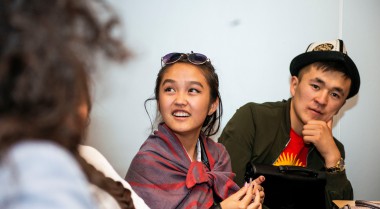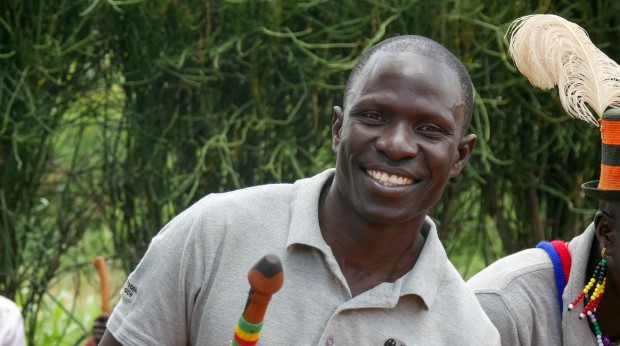
Peacebuilding and the value of the network approach
I have often been asked to explain the GPPAC network and its uniqueness. By dedicated donors, passionate policymakers, and even my mother. That is why on the occasion of International Peace Day 2022, I decided to take a step back and ask why a group of local peacebuilders feels the need to come together in a network. What is its value?
My question dates back to the founding of GPPAC in 2003, when local peacebuilding organisations followed the call of late UN Secretary-General Kofi Annan, urging civil society with interest in conflict prevention to unite their efforts. That was the moment the GPPAC network was born.
The word network means a group of people with the same interests. For almost twenty years, the GPPAC network has brought together local peacebuilders who share an unwavering passion and determination for building peace. Still, the term peacebuilding network and its function remain somewhat abstract. That is why I realised that one cannot understand the necessity of a peacebuilding network and the value it brings without talking about its members. Let me introduce you to Meri, Nqobile and Rose, whose peacebuilding work exemplifies three core characteristics of our network.
Acting as a safe umbrella to bring people together
The Ulaanbaatar Process (UBP) brings together civil society experts from Northeast Asia, including from both Koreas, to exchange information, opinions, and experience to shape a peaceful future in the region. Meri from our member organisation Peace Boat impresses not only with her fluent Japanese, as she is originally from Australia but also with her ability to truly unite people during Ulaanbaatar Process meetings. The meetings are unique as Cold War divisions are still present in the region, meaning that “us” versus “them” rival politics and military threats dominate. In a conversation with a donor representative, Meri once said ‘’of course, Ulaanbaatar Process participants stay in touch with partners in the Democratic People’s Republic of Korea even when the high-level political phone lines are dead.’’ The person could almost not believe what she was saying so explicitly - that civil society has regular contact with representatives in the Democratic People's Republic of Korea. This steady relationship is only possible because the GPPAC network acts as a safe umbrella for civil society to meet under in times of stability and crisis. If the organisation in the lead of the UBP were based in one specific Northeast Asian country, the dialogue platform would not be seen as unbiased. Therefore its efforts might not have been sustained so successfully over time.
Creating an empowering space to share experiences and expertise
In August 2022, our member Nqobile with his infectious smile from Zimbabwe got in touch with Lawal from our member Building Blocks for Peace in Nigeria. Nqobile wanted to learn more about how Lawal and his colleagues supported the development of the second National Action Plan on Youth Peace and Security in Nigeria because Zimbabwe is about to embark on this exciting journey. Lawal immediately agreed to a call during which he openly shared his experience with Nqobile. He talked about challenges encountered and proudly presented good practices. This one-hour call not only stands for the safe space the GPAPC network provides for knowledge sharing but also for the expertise that exists within it. We know that informal exchanges such as these create trustful, healthy, and dynamic relationships in which peacebuilders can learn from and with each other to make their peacebuilding action impactful. And we know that Nqobile will soon use and share that learning with others, truly living the multiplier effects of our network, allowing knowledge to flow and be adapted from one context to another.
Opening doors to donors for small organisations
Rose is the Executive Director of CECORE, a small but mighty peacebuilding organisation located in the capital of Uganda, Kampala. She is devoted to her organisation's peacebuilding projects the same way she is to her family, whom she mentions a lot. Rose and her colleagues speak the local languages, engage with local communities, and understand local culture and traditions. It should be obvious that they know best how to address the different root causes of conflict in the country. However, small, local organisations such as CECORE struggle to directly access the necessary funding to maintain their crucial work. This problem lies in the current funding system and its l requirements. CECORE, with its impressive yet small-scale track record and limited staff to dedicate time to fulfilling heavy donor reporting requirements, would not have been able to scale up its work with such impact had it not been for its membership in the GPPAC network. In 2019, Rose and her colleagues teamed up with the GPPAC Global Secretariat, based in The Hague, to raise funds from the German Ministry of Foreign Affairs. In this process that we call locally-led peacebuilding, CECORE was in the lead in designing the whole project proposal. The entire proposal was built on the input of other GPPAC members from neighbouring countries, making the project more regionally sensitive and relevant. The Global Secretariat was a mentor in the writing process and supported CECORE by connecting it to potential donors. It also provided light support during reporting periods. The network allowed Rose and her colleagues to do what they do best - design and implement peacebuilding activities. With great success. CECORE is now successfully partnering directly with the German Ministry of Foreign Affairs on its ‘’Peace Champion’’ project, without the support of GPPAC GS. As Rose explains
‘’GPPAC offered us a launchpad. It really supported us in strengthening our skills, especially in reporting that helped us secure direct funding on our own.’’
Rose, Nqobile, and Meri are just three of our hundreds of members. However, their personal experiences with the network bring out so strongly what makes the GPPAC network unique and impactful. First and foremost, the trust we place in each other and the recognition of our peacebuilding expertise. Rose, Nqoible, and Meri prove that the network approach in peacebuilding works because it empowers organisations and elevates their peacebuilding approaches so desperately needed to build sustainable peace. It also fosters the exchange of experience and expertise, which means we do not have to reinvent the wheel in peacebuilding; so much knowledge is there. And lastly, the network is a safe umbrella that brings people together across divides. What better start could there be to lay the foundation for peace?

